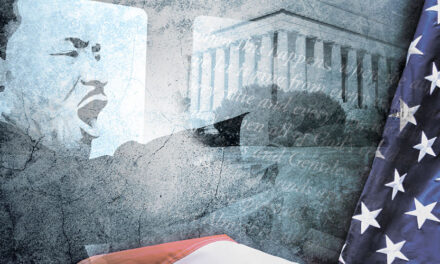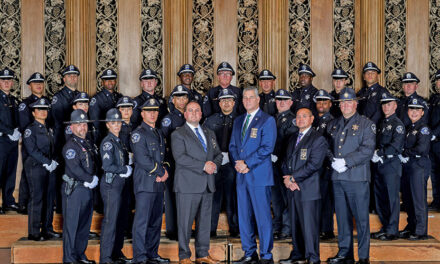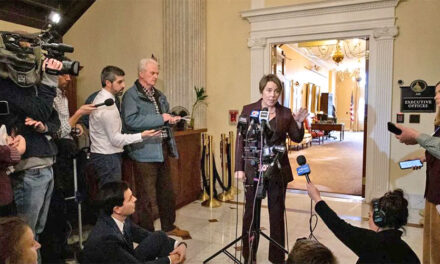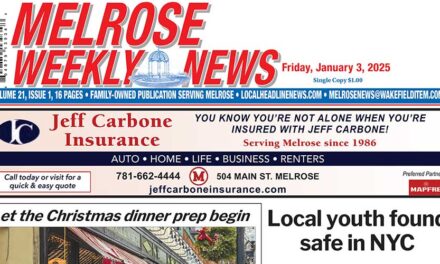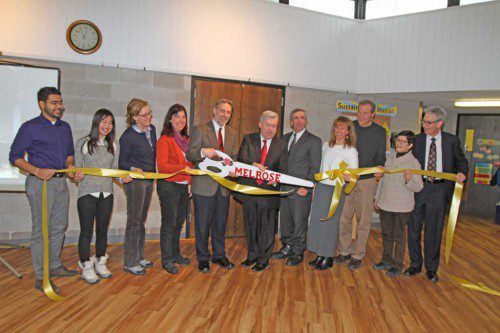
ATTENDING THE March 5 ribbon cutting ceremony at the First Congregational Church were (left to right): Ani Krishnan, MAPC; Kimberly Le, EnergySage; Martha Grover, Melrose energy efficiency manager; Nancy Brincheiro, Senior Deacon, FCC; Rev. Dominic Taranowski; Mayor Rob Dolan; Ward 6 Alderman Peter Mortimer; Lori Timmermann, Melrose solar coach; Bob Clarke, 621 Energy; Lisa Oosterman, capital campaign committee co-chair; and Jim Oosterman (capital campaign committee co-chair).
MELROSE — Melrose’s First Congregational Church (FCC), located at 121 West Foster St., now has the largest non-municipal solar array in the city. The solar system was officially launched at a March 5 ceremony attended by Mayor Rob Dolan.
As part of an overall energy-efficiency effort, the church recently installed 360 solar panels on its roof. The 101 kilowatt system is designed to provide 65 percent of the FCC’s electricity, resulting in more than $7,000 in savings during the first year alone. Over the expected 30-year lifetime of the system, the solar array is projected to save $270,000 in electricity costs.
“Because we have electric heat, our electricity bills have become somewhat of a burden so we decided to do something about it,” said Jim Oosterman, Capital Campaign co-chair at the FCC. “We’ve upgraded our lighting, insulation, weatherization and air sealing. Our most recent project was to make use of solar energy.
“It’s not only going to save us on our utility bills but also demonstrates our commitment to environmental responsibility. We’ll be responsible for fewer greenhouse gas emissions since we’ll be using less electricity.”
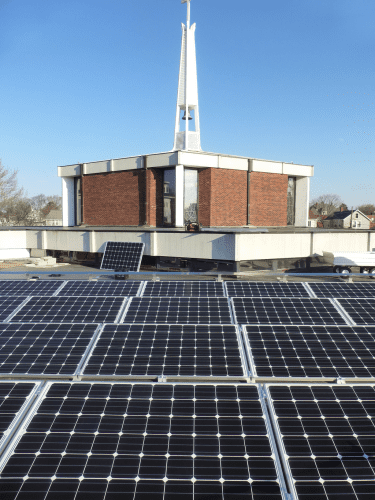
SOLAR PANELS ON THE roof of the First Congregational Church are projected to save $270,000 over their lifetime.
The FCC is also using the solar array as an educational tool, teaching members and visitors about the benefits of renewable energy. “In the main lobby, we’ve created a sustainability station that will have pamphlets and displays about the solar panels and other energy-efficiency projects undertaken by the church,” said Lori Timmermann, a member of the congregation who is a solar energy advocate and sustainability coach.
“Each month, we’ll focus on a different area, such as recycling, home energy efficiency, the farmers market and the value of local shopping.”
The solar array is being financed by a power purchase agreement (PPA) with the contractor, 621 Energy. Through this agreement, the FCC is essentially leasing the solar panels in exchange for a guaranteed electric rate, which is lower than the standard utility charges. Thus the church is able to reap substantial energy and monetary savings without having to incur the full cost of solar installation.
“Faith communities have a responsibility to respond to climate change,” said Rev. Dominic Taranowski, the FCC pastor. “It is important to educate ourselves and pray about this crucial problem but ultimately it is important to do something about it! The solar array and the other sustainability improvements we have made to our facility represent our ongoing response to be active stewards of God’s creation.”

